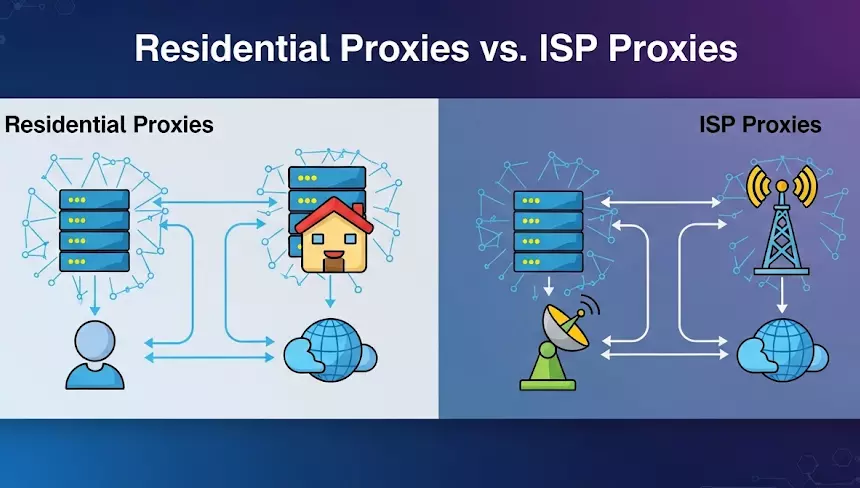In the realm of web scraping, data collection, and online automation, proxies play a pivotal role in ensuring anonymity, bypassing geo-restrictions, and maintaining uninterrupted access to target websites. Two prominent types of proxies that serve these purposes are Residential Proxies and ISP Proxies. While both are designed to mask a user’s real IP address, they differ significantly in their origin, performance, and ideal use cases.

What Are Residential Proxies?
Residential proxies are IP addresses assigned to real residential devices by Internet Service Providers (ISPs). These proxies route your internet traffic through a real user’s device, making the traffic appear as if it’s originating from a legitimate household. This authenticity makes residential proxies highly effective in bypassing anti-bot measures and accessing geo-restricted content.
Key Features:
- Real User IPs: Traffic appears as if it’s coming from actual residential users.
- High Anonymity: Difficult for websites to detect as proxy traffic.
- Global Reach: Access to a vast pool of IPs across various locations.
Use Cases:
- Web Scraping: Collecting data from websites without triggering anti-bot defenses.
- Ad Verification: Ensuring ads are displayed correctly across different regions.
- Price Comparison: Monitoring competitor pricing strategies in real-time.
What Are ISP Proxies?
ISP proxies are a hybrid between datacenter and residential proxies. They utilize IP addresses provided by ISPs but are hosted on servers in data centers. This combination offers the speed and stability of datacenter proxies with the legitimacy of residential IPs.
Key Features:
- ISP-Provided IPs: IPs are registered with ISPs, lending them credibility.
- High Speed and Stability: Hosted in data centers, ensuring consistent performance.
- Reduced Detection: Less likely to be flagged as proxy traffic by websites.
Use Cases:
- SEO Monitoring: Tracking search engine rankings without geo-restrictions.
- Account Management: Managing multiple accounts simultaneously without being detected.
- Market Research: Gathering competitive intelligence without triggering anti-bot measures.
Residential vs. ISP Proxies: A Comparative Overview
| Feature | Residential Proxies | ISP Proxies |
| Origin | Real user devices via ISPs | ISP-assigned IPs hosted in data centers |
| Speed | Variable, depending on the user’s connection | High, due to data center infrastructure |
| Stability | Can be inconsistent | Generally stable |
| Anonymity | Very high | High |
| Detection Risk | Low | Low to medium |
| Cost | Higher, due to sourcing real user IPs | Moderate, balancing cost and performance |
Advantages and Disadvantages
Residential Proxies
Advantages:
- High Authenticity: Mimic real user behavior, reducing the risk of detection.
- Extensive IP Pool: Access to a large number of IPs across various locations.
- Effective for Sensitive Tasks: Ideal for tasks requiring high anonymity and bypassing strict anti-bot measures.
Disadvantages:
- Variable Performance: Speed and stability can vary based on the real user’s internet connection.
- Higher Cost: Due to the need to source real user IPs, residential proxies tend to be more expensive.
ISP Proxies
Advantages:
- Consistent Performance: Hosted in data centers, ensuring high speed and stability.
- Legitimate IPs: Registered with ISPs, lending credibility and reducing detection risk.
- Cost-Effective: Offers a balance between performance and cost.
Disadvantages:
- Limited IP Pool: Fewer IPs compared to residential proxies, which may limit geographic targeting.
- Potential Detection: While less likely, there’s still a chance of detection by advanced anti-bot systems.
Choosing the Right Proxy for Your Needs
Selecting between residential and ISP proxies depends on your specific requirements:
- Opt for Residential Proxies if your tasks involve:
- Accessing geo-restricted content.
- Bypassing sophisticated anti-bot measures.
- Conducting sensitive data collection that requires high anonymity.
- Opt for ISP Proxies if your tasks involve:
- High-speed data collection with consistent performance.
- Managing multiple accounts without detection.
- SEO monitoring and market research require reliable access.
How IPFLY Supports Both Proxy Types

IPFLY offers a global proxy network designed for web scraping, e-commerce, and enterprise data collection:
- Extensive IP Pool – Over 90 million IPs across 190+ countries.
- Rotating and Static Options – Residential proxies for large-scale scraping, ISP proxies for high-speed tasks.
- Reliable Performance – High success rates with minimal blocks or CAPTCHA.
- Scalable Infrastructure – Support thousands of concurrent requests for global operations.
- Secure and Compliant – Ensure privacy and uninterrupted access.
IPFLY’s infrastructure allows businesses to combine residential and ISP proxies for fast, secure, and reliable operations, whether performing web scraping, market research, or e-commerce monitoring.
Best Practices
- Select the Right Proxy Type – Residential for authenticity, ISP for speed-critical tasks.
- Rotate IPs for High-Volume Requests – Reduce risk of detection.
- Leverage Automation and Parallel Processing – Increase efficiency in data collection.
- Monitor Proxy Performance – Track latency, blocked requests, and success rates.
- Use Trusted Providers – IPFLY ensures reliable and scalable solutions.
Conclusion
Both Residential Proxies and ISP Proxies offer unique advantages tailored to different use cases. Understanding their differences and aligning them with your specific needs will ensure optimal performance and efficiency in your online activities. Whether you require the authenticity of residential IPs or the speed and stability of ISP-assigned IPs, choosing the right proxy type is crucial for achieving your objectives.
By using IPFLY, businesses can access a large global network of residential and ISP proxies, ensuring fast, secure, and scalable data operations. Combining both types strategically maximizes performance and reduces risks associated with web scraping and market intelligence.
👉 Join the IPFLY Telegram community to stay updated on the latest strategies for proxy solutions, web scraping, and e-commerce optimization.


